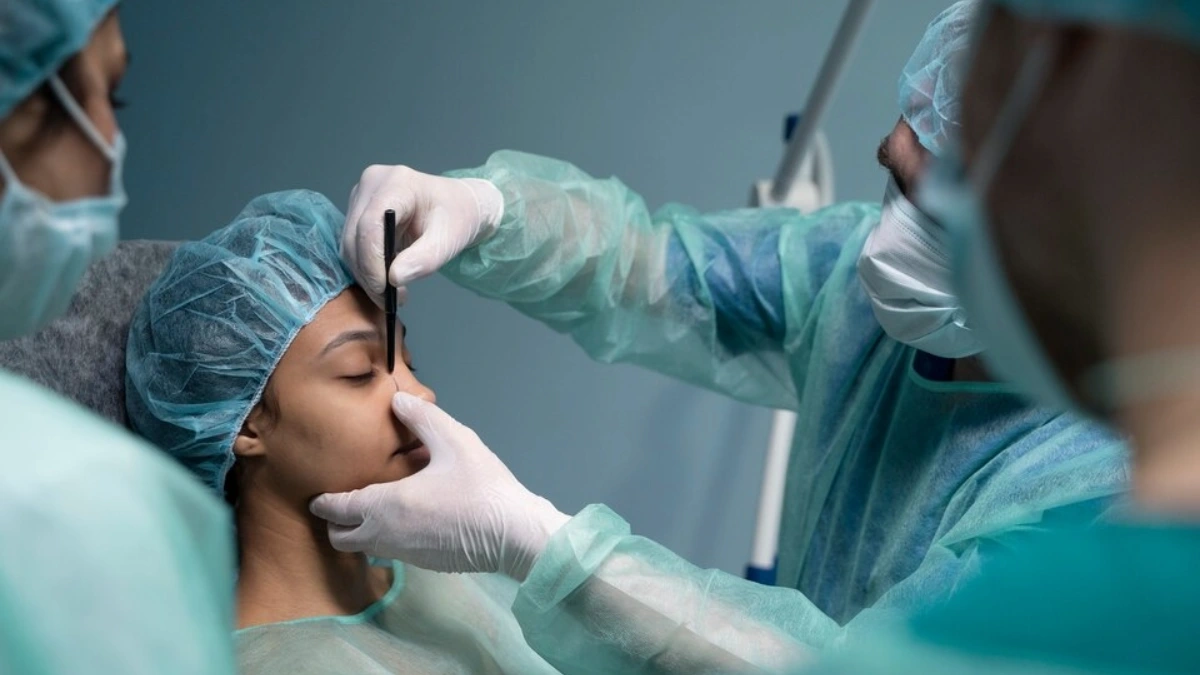Septoplasty in Turkey is a sophisticated surgical procedure that aims to straighten the nasal septum—the vital partition of bone and cartilage that divides the nasal cavity into two passages. When this septum is deviated, either due to congenital issues or injury, it can significantly hinder airflow. This leads to symptoms such as nasal obstruction, recurrent sinus infections, and frequent nosebleeds. Our experienced surgeons in Turkey meticulously reshape and reposition the septum to restore optimal breathing and functionality.
What is Septoplasty Surgery?
Septoplasty or septal perforation repair in Turkey is a surgical procedure that corrects a deviated nasal septum—the thin wall of cartilage and bone that divides the nasal passages. In many cases, people with a deviated septum experience breathing difficulties, nasal congestion, or frequent nosebleeds. Septoplasty offers an effective solution for these issues. During the procedure, the surgeon carefully removes or repositions the excess cartilage and bone to create a straighter nasal septum. This ultimately improves airflow and overall nasal function. Typically performed under local or general anaesthesia, septoplasty is usually an outpatient procedure. Patients often resume their normal activities within a week. Overall, this surgery is designed to enhance both comfort and quality of life. It is a popular choice for those with chronic nasal issues.
Why Choose Septoplasty in Turkey?
Choosing septoplasty surgery in Turkey offers numerous advantages for patients seeking high-quality and affordable nasal surgery. Firstly, Turkey is renowned for its state-of-the-art medical facilities and highly skilled surgeons. These professionals specialise in ENT procedures like septoplasty. Moreover, the cost of septoplasty in Turkey is significantly lower compared to many Western countries, without compromising on the quality of care. Additionally, Turkey’s hospitals often provide personalised treatment plans and modern technologies. These ensure a safe and effective surgical experience. Beyond the medical benefits, patients can also enjoy the country’s rich culture and beautiful surroundings during their recovery. For these reasons, Turkey has become a popular destination for septoplasty, offering expert care at an excellent value.
The Septoplasty Procedure
Preoperative Consultation and Assessment
Before surgery, patients undergo a detailed examination and imaging, such as CT scans, to assess the severity of the deviation. Surgeons tailor the surgery to the patient’s unique nasal anatomy and medical history.
Anaesthesia and Incisions
Septoplasty in Turkey is performed under general anaesthesia (or local anaesthesia with sedation). Small, precise incisions are made inside the nasal cavity to access the septum.
Correction of the Deviated Septum
The surgeon carefully removes or repositions obstructive portions of bone and cartilage. In some cases, turbinate reduction is performed simultaneously to enhance breathing.
Use of Dissolvable Sutures and Splints
The septum is secured with dissolvable sutures and supported with nasal splints to ensure proper healing and optimal results.
Benefits of Septoplasty in Turkey
- Improved nasal breathing
- Reduced nasal congestion and sinus infections
- Enhanced sleep quality
- Relief from sleep apnea symptoms
- Better overall quality of life
Risks and Potential Complications
While septoplasty in Turkey is generally safe, risks include:
- Bleeding and infection
- Scarring and temporary numbness
- Nasal septum perforation (rare)
- Temporary reduction in sense of smell
- Possible need for revision surgery
Recovery After Septoplasty in Turkey
Immediate Postoperative Care
Patients are advised to:
- Sleep with their head elevated
- Avoid strenuous activities
- Refrain from blowing their nose
Mild swelling, bruising, and nasal congestion are normal and subside over time.
Long-Term Healing
Most patients notice a significant improvement in breathing within a few months as their tissues fully adapt.
Why Choose Turkey for Septoplasty?
Turkey’s world-class clinics and internationally trained surgeons make it a top choice for medical travellers. They seek effective septoplasty at competitive prices.
Cost of Septoplasty in Turkey
The cost of septoplasty in Turkey is considerably more affordable compared to many Western countries. This makes it a popular choice for international patients seeking high-quality care at competitive prices. On average, septoplasty in Turkey ranges from $1,500 to $3,000. This depends on factors such as the clinic’s reputation, the surgeon’s experience, and any additional procedures like turbinate reduction. Despite the lower cost, Turkey’s healthcare system is renowned for its state-of-the-art facilities. Internationally accredited clinics ensure that patients receive top-tier medical care without compromising on safety or results.
Conclusion
In conclusion, Rhinoplasty and septoplasty in Istanbul Turkey, represent an excellent choice for those seeking expert nasal correction with a balance of quality and affordability. The country’s advanced medical infrastructure, experienced surgeons, and personalised care ensure successful outcomes and patient satisfaction. Among the top facilities, Avicenna International Hospital stands out for its commitment to cutting-edge techniques. They offer comprehensive patient support throughout the treatment journey. Choosing Turkey—and specifically Avicenna International Hospital—for your septoplasty means entrusting your health to dedicated professionals while experiencing the best in medical tourism.
In Turkey, there are many skilled septoplasty surgeons; therefore, choosing a board-certified specialist at a reputable hospital like Avicenna International Hospital ultimately ensures high-quality care.
Surgeons perform septoplasty by carefully reshaping or removing the obstructive cartilage and bone; as a result, this straightens the nasal septum and significantly improves airflow.
Turkey is widely considered one of the best countries for septoplasty, thanks to its experienced surgeons, affordable prices, and modern medical facilities.







